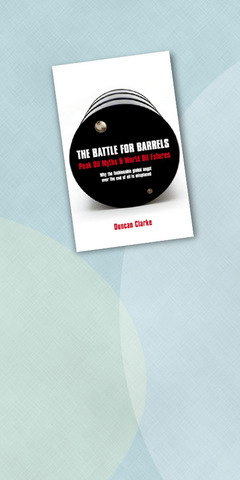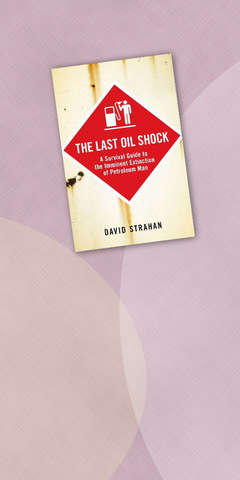Back in 1956, an American geophysicist called Marion King Hubbert came up with a startling prediction: that production of oil from the continental US would peak within the next 10 to 15 years. Few paid any attention. This, after all, was the era when the car was king and king-sized; when James Dean was racing in the streets in Rebel Without a Cause and former US president Eisenhower was investing billions of US dollars in the interstate network.
Yet Hubbert's prediction proved unerringly correct. Peak oil — as it was known — duly arrived right on cue in 1970, and since then the US has become more and more dependent on imported crude to meet growing demand for energy. There was, however, another dimension to Hubbert's analysis. The same model, he said, could be used to estimate when peak oil would arrive, not just for the US, but for the entire globe. That moment, he said, would come in about half a century; round about now, in other words.
Hubbert's many champions have used his work to construct a theory of just about everything. Peak oil explains why oil prices are so high; it explains why US President George Bush invaded Iraq and why there is a new scramble for Africa. As the world's oil wells start to run dry, there will be recession and war. After a century or more in which modern industrial societies have been built on seemingly unlimited supplies of oil, the lights are about to go off.

In The Last Oil Shock, David Strahan argues that we ignore the warnings at our peril. Modern industrial societies, he says, are dependent on oil, but over the past 50 years it has become evident that all the big fields have been discovered. Oil companies are busily exploring inhospitable parts of the globe and using the most up-to-date technologies to extract more crude from existing fields, but sooner or later we are going to have accept the inevitable: supply will be unable to keep up with demand.
Even worse, Strahan sees no possibility that alternatives to oil will be developed in time to prevent a full-scale economic crisis. The Last Oil Shock dismisses the idea that we can move seamlessly into an age of hydrogen-powered cars, biofuels and wind farms. Instead, we all need to be changing our lifestyles: buying smaller cars, driving less aggressively, taking our rucksacks to the shops to avoid using plastic carrier bags, spurning apples that have been shipped halfway round the world.
Duncan Clarke's The Battle for Barrels says we should take warnings of impending armageddon with a pinch of salt. The peak oil theorists take an overly deterministic view of the world, he argues, and far from being imminent, peak oil may be decades, perhaps even a century, ahead. His argument is that it is far too simplistic to extrapolate, with any degree of precision, when the world will reach the point of maximum oil production from Hubbert's 50-year-old study of the US.

Clarke, who has 25 years of experience in the oil exploration business, says the flaw in the peak oil argument is that it ignores the basic rules of economics: that when the price of something goes up, either supply increases or demand falls. It doesn't make financial sense to explore particularly inhospitable parts of the world when oil prices are US$10 a barrel; but it is quite a different story when a barrel of crude is changing hands at US$60 a barrel.
The evidence from the oil industry suggests that Clarke has a point. Following the two oil shocks of the 1970s, exploration activity was high in the first half of the 1980s, then fell sharply as oil prices tumbled, and carried on declining throughout the 1990s. According to the peak oil analysis, the decline in exploration is a function of geology; there's simply less oil to find. According to Clarke, it's a question of dollars and cents, and the doubling of the oil price since 2003 should lead to renewed activity. But, as Strahan points out, that presupposes the oil is there in the first place. Even adjusted for inflation, the price of crude is much higher now than it was 50 years ago, yet discoveries of new reserves have fallen sharply over the same period. Nor does technology seem to help that much; the US and the UK have some of the most advanced oil industries in the world, yet production in both countries is still in inexorable decline.
There's not a lot of love lost between the two camps. Strahan says Clarke and, indeed, the whole of the mainstream global oil industry is in class-one denial about the looming energy crisis. Clarke's view is that the peak oilers are using a flawed methodology to come up with unfounded and alarmist conclusions. There's clearly a market out there for both books: an Internet search for "peak oil" comes up with more than six million hits.
Of the two books, Strahan's is definitely the better read. The Battle for Barrels is barely 250 pages long, but it's tough going, giving the impression of being a much shorter academic paper expanded to book length. There is far too much repetition and score-settling, and, unless you happen to work in the oil industry or be obsessed with peak oil, the excessive use of acronyms makes it impossible to read without one finger permanently wedged in the glossary at the back. The writing is leaden and all too frequently lapses into management-speak. Referring to the debate about the size of global oil reserves, for example, Clarke says: "Here it is pertinent to note that peak oil forecasters do not enjoy an undiluted view of the state or corporate portfolios that contain these internal and hidden assessments which their models logically require." Presumably that sentence means something; it is by no means clear what.
Although it will win no prizes for the limpidity of its prose, The Battle for Barrels is a useful corrective to Strahan's argument that the end is nigh. In the end, of course, the peak oil lobby will be proved right. Oil is a finite resource, and once the last drops are squeezed from the Middle East, once the Canadian tar sands have been exploited and the frozen wastes of the Antarctic have been sucked dry, the world will have to find another source of energy. What's really at issue is when that moment will be.

Growing up in a rural, religious community in western Canada, Kyle McCarthy loved hockey, but once he came out at 19, he quit, convinced being openly gay and an active player was untenable. So the 32-year-old says he is “very surprised” by the runaway success of Heated Rivalry, a Canadian-made series about the romance between two closeted gay players in a sport that has historically made gay men feel unwelcome. Ben Baby, the 43-year-old commissioner of the Toronto Gay Hockey Association (TGHA), calls the success of the show — which has catapulted its young lead actors to stardom -- “shocking,” and says

The People’s Republic of China (PRC) invaded Vietnam in 1979, following a year of increasingly tense relations between the two states. Beijing viewed Vietnam’s close relations with Soviet Russia as a threat. One of the pretexts it used was the alleged mistreatment of the ethnic Chinese in Vietnam. Tension between the ethnic Chinese and governments in Vietnam had been ongoing for decades. The French used to play off the Vietnamese against the Chinese as a divide-and-rule strategy. The Saigon government in 1956 compelled all Vietnam-born Chinese to adopt Vietnamese citizenship. It also banned them from 11 trades they had previously

Inside an ordinary-looking townhouse on a narrow road in central Kaohsiung, Tsai A-li (蔡阿李) raised her three children alone for 15 years. As far as the children knew, their father was away working in the US. They were kept in the dark for as long as possible by their mother, for the truth was perhaps too sad and unjust for their young minds to bear. The family home of White Terror victim Ko Chi-hua (柯旗化) is now open to the public. Admission is free and it is just a short walk from the Kaohsiung train station. Walk two blocks south along Jhongshan

Snoop Dogg arrived at Intuit Dome hours before tipoff, long before most fans filled the arena and even before some players. Dressed in a gray suit and black turtleneck, a diamond-encrusted Peacock pendant resting on his chest and purple Chuck Taylor sneakers with gold laces nodding to his lifelong Los Angeles Lakers allegiance, Snoop didn’t rush. He didn’t posture. He waited for his moment to shine as an NBA analyst alongside Reggie Miller and Terry Gannon for Peacock’s recent Golden State Warriors at Los Angeles Clippers broadcast during the second half. With an AP reporter trailing him through the arena for an